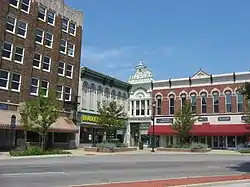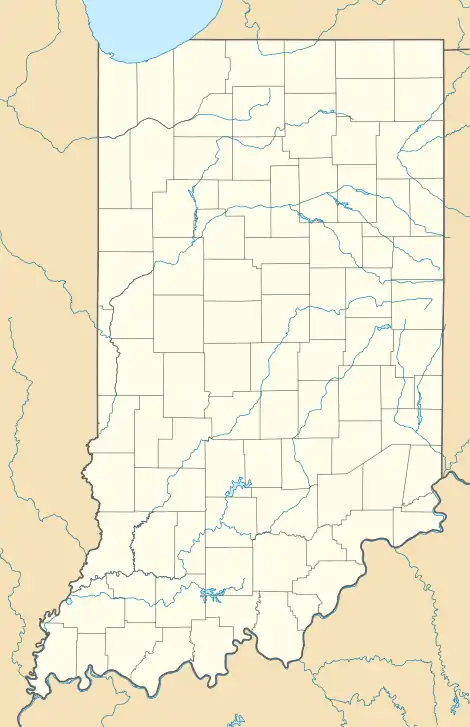Shelbyville Commercial Historic District | |
 Shelbyville Commercial Historic District, August 2011 | |
  | |
| Location | Roughly bounded by Broadway, Tompkins, Mechanic, and Noble Sts., Shelbyville, Indiana |
|---|---|
| Coordinates | 39°31′27″N 85°46′33″W / 39.52417°N 85.77583°W |
| Area | 41.5 acres (16.8 ha) |
| Built | 1822 |
| Architect | Multiple |
| Architectural style | Late 19th And 20th Century Revivals, Late Victorian, Arts & Crafts |
| NRHP reference No. | 84001638[1] |
| Added to NRHP | August 9, 1984 |
Shelbyville Commercial Historic District is a national historic district located at Shelbyville, Shelby County, Indiana. The district encompasses 149 contributing buildings, 1 contributing site, and 2 contributing objects in the central business district of Shelbyville. It developed between about 1822 and the 1930s, and includes notable examples of Italianate, Second Empire, Beaux-Arts, Classical Revival, and Art Deco style architecture. Notable contributing resources include the Shelbyville Central Schools Administrative Offices (1912), Carnegie Library (1902), First Baptist Church (1903), St. Joseph Catholic Church and School (1908), Civic Center (1932), Melton Jewelry Store (1886), Blessing-Deprez Building (1869), Knights of Pythias (1901), Cherry Building (1889), I.O.O.F. Building (1895), Old High School Building (1886), and a statue of Charles Major (1929).[2]
It was listed on the National Register of Historic Places in 1984.[1]
References
- 1 2 "National Register Information System". National Register of Historic Places. National Park Service. July 9, 2010.
- ↑ "Indiana State Historic Architectural and Archaeological Research Database (SHAARD)" (Searchable database). Department of Natural Resources, Division of Historic Preservation and Archaeology. Retrieved July 1, 2016. Note: This includes Jack Warble and Robert T. Thopy (January 1981). "National Register of Historic Places Inventory Nomination Form: Shelbyville Commercial Historic District" (PDF). Retrieved July 1, 2016., site map, and Accompanying photographs

